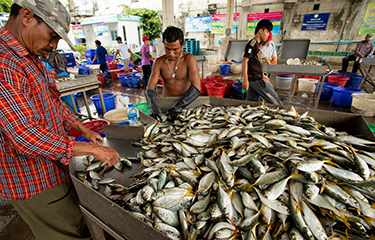A new research paper has criticized alleged shortcomings in the recent addition of a social component and remit to fishery improvement projects.
International Transport Workers' Federation Fisheries Section Fisheries Expert Chris Williams, along with University of Nottingham Assistant Professor and Rights Lab Associate Director Jessica Sparks, described their major findings in a SeafoodSource op-ed in September 2022.
Their research paper, “Fishery improvement projects: A voluntary corporate 'tool' not fit for the purpose of mitigating labour abuses and guaranteeing labour rights for workers,” was recently published in the Marine Policy Journal.
Fishery improvement projects (FIPs) are multi-stakeholder initiatives that use the buying power of the industry to influence change and improvements in a fishery, engaging NGOs, industry, retailers, importers, processors, and other stakeholders. Recently, FIP reporting site FisheryProgress.org adopted a newly developed human rights and social responsibility policy with the goal of addressing the issue of human and labor rights violations.
The published paper describes how this policy is not successful in mitigating these abuses. There are no enforceable repercussions and sanctions for failure to address human rights abuses as there is no legally binding agreement creating clear and defined rules governing labor. Additionally, a reliance on self-reporting is leading to inaccurate representations of improvements in FIPs.
The paper delves into what its authors describe as a false dichotomy regarding human rights in the seafood industry. Human rights are either taken care of or not - there is no making progress toward upholding fundamental human rights, according to the authors. Furthermore, allowing room for so-called "progress" on human rights results in retailers with zero-tolerance policies continuing to source from FIPs under the guise of fisheries having in place a plan for improvement, they wrote.
The authors describe how a focus on fishing profitability can lead to new interventions actually increasing worker vulnerability, as labor exploitation results in higher profits for many players in the supply chain. Current FIP frameworks will continue to benefit companies and NGO partners, but not the fishers they are intending to help without a new approach toward labor issues, the authors conclude.
Market-based pressures can be successful in certain circumstances, but current FIP policies won’t be for labor issues due to a lack of fixed benchmarks and binding agreements with retailers, according to Williams and Sparks. They also criticize the fact that FIP governance currently requires little to no involvement of labor unions, and the fact that FIPs do not have a mechanism that is legally binding for the inclusion of needs or necessary improvements of work conditions.
Photo courtesy of stockphoto mania/Shutterstock







